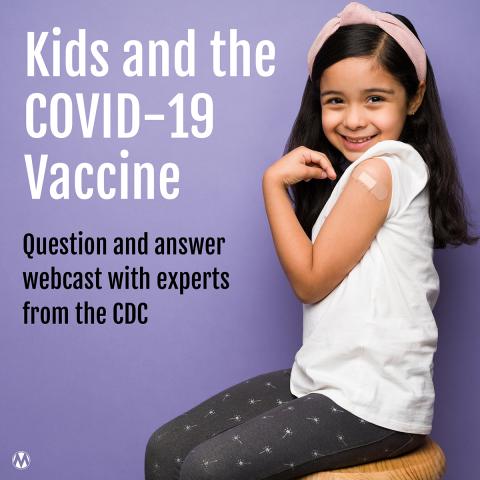
MomsRising recently hosted a conversation with experts from the CDC to talk about the kids' COVID-19, vaccine. Below is a summary of our questions and answers. (Se puede leer en español aquí.)
Felicia Burnett, National Director for health care at MomsRising: How do we know that the covid vaccine is safe, given that it is so new, and is there any risk of long-term side effects?
Dr. Christa-Marie Singleton, Pediatrician, Chief Medical Officer in the CDC’s Office of the Associate Director for Policy and Strategy; senior medical advisor regarding clinical to community population health interventions: The covid 19 vaccine is the most important part of our arsenal to keep our kids safe. Although the vaccine appeared quickly- within 2 years of the start of the pandemic- the platform that the vaccine is based on has been studied for 30 years. So although it might seem that the vaccine was rushed, we had a 30 year head start and then we were able to take it to the finish line. The trials of the vaccine for kids went longer than the trials for adults because we wanted to make sure that this vaccine is safe; the kids trials went through extra safety measures to make sure we weren’t missing anything. Our kids are our most precious resource.
Felicia: Can you talk about the effect of the vaccine on fertility?
Dr. Singleton: We’ve learned that the disease itself- COVID-19- is associated with decreased fertility in men. We’ve also seen that women who received the vaccine during pregnancy have had great pregnancy outcomes and healthy babies. We’ve seen that people who became pregnant and were not vaccinated had worse outcomes- the vaccine is not causing bad pregnancy outcomes, it’s the disease itself. The vaccine is not causing any fertility problems.
Felicia: Parents have heard repeatedly that COVID-19 does not impact kids as severely as adults. Why is it important for all children to get vaccinated against COVID-19?
Dr. Singleton: Children can get COVID-19, and they are at risk for getting very sick. Since the beginning of the pandemic, children ages 5-11 have experienced over 8000 COVID-19 related hospitalizations and right now COVID-19 is one of the top 10 causes of death for kids ages 5-11. We’re also seeing that, once they’ve had COVID-19, kids are at risk for a serious complication called multi-system inflammatory syndrome or MIS-C. The disease COVID-19 causes these long-term effects. Getting all kids who are eligible, right now that’s ages 5 and up, vaccinated is our strongest defense, together with layered strategies such as masking and physical distancing.
Felicia: If the adults in the household are vaccinated, do the kids also need to be vaccinated?
Dr. Singleton: Yes. The disease COVID-19 is worse than any of the possible side effects of the vaccine like 1-2 days of feeling tired or having a headache or a sore arm. It’s not just about protecting kids, it’s also about protecting those who they come in contact with, like elderly relatives.
Felicia: If kids are vaccinated and have a breakthrough COVID-19 infection, can they still spread the virus?
Dr. Singleton: I look at it as a layered strategy. If it’s raining outside and you want to protect yourself, you might put on rain boots. But that will only protect your feet, so then you add another layer and put on a raincoat, and then a hat, and an umbrella. The water can still sneak in some places, but you won’t get as wet.
Even though the vaccine is excellent protection, there are still times when the virus can sneak through. What we’re seeing with the current Omicron variant is that it can sneak through, but if you’ve got layered protection- like the boots, coat, hat and umbrella- you won’t get as sick, in fact you might not have any symptoms at all.
Felicia: If a child is not vaccinated and they get COVID-19, do they still need to get vaccinated?
Dr. Singleton: Yes. Once you are vaccinated, you are protected, like wearing a coat. But eventually that coat wears thin. After an infection, you also are protected, but again, that protection wears thin. We recommend vaccination about 3 months after an infection to add an additional layer of protection.
Felicia: If a child is vaccinated and he’s exposed to COVID-19 in school, will he need to quarantine?
Dr. Singleton: That’s an important question, because we really want to get kids back in school. Our current recommendations are that if a child is vaccinated, and then exposed to COVID-19, if the child has no symptoms at all, then they do not have to quarantine. If they have symptoms, they should definitely quarantine. Even if the child has no symptoms, about five days after the exposure it’s recommended to get the child tested, to make sure they’re free of COVID-19. In those five days between exposure and testing, it’s recommended that the child wear a mask around other people and to monitor closely for any symptoms.
Felicia: Can children who have been vaccinated stop wearing masks in group settings?
Dr. Singleton: At home with family members, it is ok to not wear masks. In other indoor settings, it is recommended that kids wear masks, because it’s an additional layer of protection. Outdoors, if able to remain physically distant, it is ok to not wear a mask.
Felicia: Some of the guidelines have shifted recently, which is frustrating for parents. What is the rationale for these changes?
Dr. Singleton: These changes may be frustrating, but we are going where the science leads us. We have learned more and more about the virus after studying it for the last 2 years, so now we recommend higher grade masks such as N95 and KN-95 masks, with a good tight fit. We also saw that Omicron causes sickness sooner than other variants, so we changed testing recommendations to 3-5 days, instead of 5-7. As the science changes, the recommendations change to help keep our communities safe.
Felicia: Can children who have high medical needs or are immunocompromised get the COVID-19 vaccine?
Dr. Singleton: Absolutely. People with a weakened immune system are especially vulnerable to some of the worst effects of COVID-19. Anyone age 5 and older, particularly those who have illnesses and conditions that put them at higher risk, are encouraged to get the COVID-19 vaccine. For these children in particular we recommend they receive 3 primary doses- in other words, they should receive the regular two dose regiment, and then 28 days after their second dose they should get an third primary dose. This will help build up their immune system, which is weaker.
Felicia: Are there any special barriers that immigrant families face?
Dr. Singleton: These families should not face any barriers. This vaccine is free to everyone, regardless of immigration and insurance status. Families can go to any place where the vaccine is offered- grocery stores, pharmacies, health departments- and receive it. If you have insurance, it will be billed, but if you don’t have health insurance you can still receive the vaccine without any charges. Community groups serving immigrants and non-English speakers can get this message out and can consider partnering with local or state health departments to be a trusted site for vaccination drives.
Felicia: We’ve heard concerns from immigrant parents wondering what impact getting the vaccine might have on their immigration status. Does getting the vaccine for themselves or their children have any impact on immigration status or a future immigration case?
Dr. Singleton: Everyone is eligible for COVID-19 vaccines and services no matter what their immigration status is. Vaccination and testing information is not shared with immigration agencies and vaccination should not affect their immigration status.
Felicia: How can I, as a parent, calm my child’s fears about getting a covid-19 vaccination?
Dr. Singleton: There are several strategies to consider. First, pick a familiar location, like your usual source of medical care, because that can be comforting. If your child has a favorite bear or toy, they can hold that as well. Telling your child what to expect can also help- be honest. If they have a fear of needles, check the CDC website for information that can help. You can also consider numbing creams or sprays that you can find over the counter- those types of products can help. Let your child know about possible side effects, and if possible, try to get them vaccinated at a time when they have the time to recover, like right before a weekend. Kids can also take over-the-counter pain medication. Remind your child that side effects are a sign that their body is getting stronger to fight off COVID-19.
Felicia: Where can parents go to get information?
Dr. Singleton: CDC.gov. We’ve got infographics, videos, lots of information that parents can take to their communities. Sign up for vsafe, which is a smartphone app. Once your child gets the vaccine, vsafe will send you messages- daily at first, and then weekly. It is a way for us to monitor how kids are doing with the vaccine. That’s why we can say with confidence now, after almost a year of children’s vaccinations, what kinds of side effects kids are having. The Vsafe app, on CDC.gov, is a way you can be part of the science.
Felicia: Do you have any tips, as a pediatrician, a parent, for how to have conversations with people who may have different views about vaccination?
Dr. Singleton: First, it is everyone’s choice to be vaccinated. And although some kids have very few symptoms from having COVID-19, some kids will get really sick. Vaccination helps protect all of us- it’s a way to keep our communities safer, and our families safer. It gives our children the best chance to be their best selves, to enjoy all of the wonderful things childhood offers them.
Final words by Dr. Singleton: Parents are making choices for their families, and they are the experts on their families. We would encourage them to go to sites for information where the information has been thoroughly vetted. Go to CDC.gov. We follow the science, and don’t put the information out until we are sure. Ask your pediatrician and your family’s doctor, it’s good to have questions. We wait and follow the science, to make sure it is safe for all communities. It’s ok to have questions, ok to have doubts. Get your questions answered and hopefully you’ll get your kids vaccinated so we can move this virus behind us.



The views and opinions expressed in this post are those of the author(s) and do not necessarily reflect those of MomsRising.org.
MomsRising.org strongly encourages our readers to post comments in response to blog posts. We value diversity of opinions and perspectives. Our goals for this space are to be educational, thought-provoking, and respectful. So we actively moderate comments and we reserve the right to edit or remove comments that undermine these goals. Thanks!